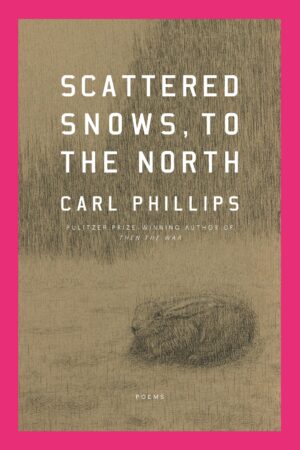Scattered Snows, to the North
by Carl Phillips
reviewed by Isabella Cho
Some aspects of Scattered Snows, to the North won’t come as a surprise to readers of Carl Phillips’s poetry. There’s the phlegmatic natural world, the disciplined lineation of verse as both a lyrical and erotic resource, regular evocations of history and myth, the deployment of topographical language to cast poems themselves as shifting ecologies, and the Pulitzer winner’s capacity to recount former intimacies with a detached candor that borders on cruelty. Though, in this collection, we also observe a new figure rise to assume prominence in Phillips’s pantheon of usual inspirations: regret. Phillips approaches it warily, like something midway between a problem and a promise. Or perhaps a non-problem, as he insists in “On Why I Cannot Promise”:
…………………………not love, never
mind what it felt like, and not
regret, which I still can’t believe in—
Though Phillips’s speaker insists regret isn’t real, the poem seems to suggest otherwise. The dissonance between the language and structural form becomes a central tension, demonstrating a new iteration of an impulse that has long marked Phillips’s verse. This is put best in “Before All of This,” in which the speaker, reflecting on the common belief that knowledge conquers superstition, says:
………….I can almost
believe in that.
Indeed, almost finds a fearsome champion in Phillips. This is not entirely surprising, because almost forces us to appraise what we hold dear and what it means to remember as we wrestle with mortality. Death looms large for Phillips here. In “This is the Light,” the speaker reflects on a recent move:
………….Now you live here, where it’s likeliest you’ll die, too, you’re finally old
enough, not just to say, but—without sorrow or fear, most of the time—to understand
the truth of it
The awareness of an encroaching end, though, isn’t always dark. It also presents moments of epiphany and play. Another distinctive feature of Scattered Snows is its conversationally confessional style. In “Regime,” Phillips enacts an enjambment that makes for tight stanzas reminiscent of haiku. The poem departs from his usually melodious and sprawling prosody:
…………It’s hard
to believe in them,
the beautiful colors
of extinction; but
these are the colors.
Phillips opens the collection with a poem that, for him, is formally unorthodox, a choice that suggests there’s something different here, a modified itch. He enacts a hesitation, a kind of halting attentiveness, to the natural world and to the more private theater of intimacy that the speaker roams through in the poem. “Artillery” presents another example of this purposeful manipulation of form as an argumentative mode, this time using apposition and enjambment:
It’s like a habit with you—your idea of tenderness—
leading the blameless a little more blameward just so
you yourself can feel a bit less lonely: In what world
is that tenderness?
Yet “Artillery” also exemplifies how Phillips’s principled formal contortions are occasionally spoiled by less considered moves. The end of “Artillery” obstructs the quietly propulsive tension it builds earlier. Take the kiss that marks the poem’s volta:
…………………………….Why not call it love—
each gesture—if it does love’s work? I pulled him
closer. I kissed his mouth, its anger, its blue confusion.
This kiss is a risk, and it pays off ferociously. Wrenching us from the landscape of psychic desire, it hurries us into a physical act that seems more nervous than purposive: the speaker isn’t kissing to impart affection, more so to stop his own mind. Less accomplished than this choice are the two descriptive qualifiers that follow “mouth”: “its anger, its blue confusion.” There’s a version of this poem that ends with that monstrous and breathtaking line: “Why not call it love— / each gesture—if it does love’s work?” Isn’t that line, after all, suffused with both anger—or at least a mild viciousness—and a confusion we might reasonably call blue?
If there exists a representative feature of a Phillips poem, it’s the application of a brutal economy to accounts of complicated intimacy. Think Occam’s razor, but for plumbing the depths of affect. It’s reasonable to misread this economy as a kind of emotional retreat, a stoicism, a disavowal, perhaps even a narrowness of spirit. Phillips knows this. He has no problem conceding it. Take the lines from the speaker in the collection’s eponymous poem:
…………………………….I’ve never
stopped missing you, I used to
practice saying, for when I’d
need those lines, as I assumed
I would
Or this admission in “Somewhere It’s Still Summer”:
…………I prefer a clean view—
Always have—unencumbered by moral valence
Or this musing in “Fist and Palm,” whose title exhales an understated menace:
There are plenty who’d hardly
recognize me now, I used to be
that cruel
Some readers may jump at this opportunity to indict Phillips. Yet he’s never just coldness, never just detachment; he returns, faithfully, to “almost.” In a later poem, aptly titled “The Closing Hour,” we observe a moment in which his unnerving candor brushes hands with wistfulness. He concedes, at last, a kind of regret:
…………………..That certain gestures
don’t so much linger as seem to make a routine of
………….unexpectedly becoming more apparent some moments
than at others doesn’t mean we miss them, means there were parts
that we loved. I regret almost nothing.
For all his discipline and restraint, Phillips can’t help but glance askance. What does he see there as he grapples with memory, that immeasurable distance where regret and almost walk together, slowly, like dancers catching their breath? Love. Probably, love.
Published on October 22, 2024

